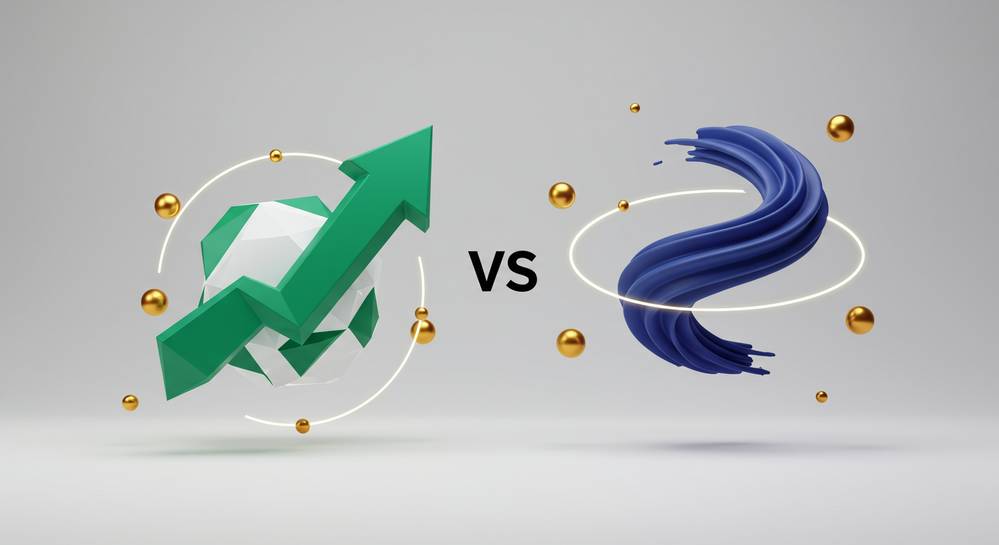Choosing where to invest your capital is a critical decision, and the stock trading vs forex trading debate is central for many aspiring traders. While both offer opportunities for profit, they are fundamentally different arenas, each with unique characteristics, risks, and rewards. This guide breaks down the essential distinctions to help you determine which market aligns better with your financial goals and trading personality, ensuring you make a well-informed decision.
Understanding the core concepts of each market

Before diving into a direct comparison of stock trading vs forex trading, it is vital to grasp their core principles. Each market operates on fundamentally different drivers, which influences every aspect from strategy to risk. Understanding this distinction is the first step toward choosing the arena that best suits your goals and analytical style.
Stock trading: Owning a piece of a business
Stock trading is the act of buying and selling shares in publicly listed companies. When you purchase a stock, you acquire a small fraction of ownership in that business. The primary goal is to profit from an increase in the company’s value, reflected in its share price. A stock’s value is tied to corporate performance, industry trends, and how economic indicators affect the stock market as a whole.
Forex trading: Speculating on national economies
Forex trading involves speculating on the fluctuating values of global currencies. Instead of owning a tangible asset, you trade currencies in pairs, such as EUR/USD. You are simultaneously buying one currency while selling another. Profit is generated from changes in the exchange rate, which is driven by large-scale forces like central bank interest rates and monetary policy, geopolitical stability, and trade balances. It is a bet on the relative economic strength of two countries.
Key differences in market structure and mechanics

While both involve financial speculation, the mechanics and structure of the stock and forex markets are vastly different. These distinctions in the stock trading vs forex trading debate have significant implications for accessibility, risk, and strategy. How each market operates dictates the tools and knowledge a trader needs to succeed.
- Market Size and Liquidity: The forex market is the largest globally, with a daily trading volume exceeding $7.5 trillion. This massive scale ensures high liquidity, allowing traders to enter and exit positions easily. The stock market, though substantial, is fragmented and smaller in volume.
- Trading Hours: Forex is a true 24-hour market, operating five days a week as it follows the sun from Sydney to New York. In contrast, stock trading is limited to the specific hours of an exchange, such as 9:30 AM to 4:00 PM ET for the New York Stock Exchange.
- Leverage and Capital: Forex brokers typically offer much higher leverage, which can amplify both profits and losses. Stock trading leverage is more restricted, often requiring more significant initial capital for equivalent position sizes.
- Analytical Focus: Forex traders concentrate on a handful of major currency pairs influenced by macroeconomic trends. Stock traders must analyze thousands of individual companies, each with its own unique performance factors and industry risks.
Factors that influence price movements

The factors driving prices are a critical distinction in the stock trading vs forex trading comparison. Understanding these catalysts is essential for building an effective strategy. Each market responds to a completely different set of economic and political signals, demanding a unique analytical approach from the trader.
What moves stock prices?
Stock prices are primarily moved by microeconomic factors tied to a specific company and its industry. A trader must focus on the health of the business itself. Key drivers include:
- Company Performance: Strong earnings reports and revenue growth typically push prices higher, while poor results have the opposite effect.
- Industry Trends: Innovations, regulatory shifts, or sector-wide news can impact all related stocks.
- Market Sentiment: Analyst ratings, news headlines, and the overall perception of how rising inflation affects stock prices play a major role.
What moves forex prices?
Forex prices react to macroeconomic events that influence entire national economies. The focus shifts from a single company to a countrys financial stability. Key drivers include:
- Interest Rate Decisions: Central bank policies are arguably the most powerful driver of a currency’s value.
- Economic Data: Key indicators like inflation, employment figures, and GDP reports often trigger significant volatility.
- Geopolitical Events: Political stability, elections, and international relations, such as those that cause undefined, directly impact currency strength.
Which trading style is the right choice for you
The choice between stock trading vs forex trading is not about which market is better, but which is better for you. The right decision depends entirely on your personal profile, including risk tolerance, available capital, and preferred trading style. There is no single correct answer. The ideal market is the one that aligns perfectly with your individual goals and resources.
To help you decide, consider the following profiles:
| Factor | Best for Stock Trading | Best for Forex Trading |
|---|---|---|
| Risk Tolerance | Lower to moderate. It suits long-term investors who prefer fundamental analysis of companies. | Higher. It is ideal for short-term speculators comfortable with high leverage and volatility. |
| Trading Style | Long-term investing, swing trading, and strategies based on company financial health. | Day trading, scalping, and technical analysis driven by macroeconomic news and trends. |
| Time Commitment | Flexible. It can be passive for buy-and-hold investors or active during specific market hours. | Requires active monitoring due to the 24-hour market and the rapid impact of global news. |
| Analytical Focus | Concentrates on individual company performance, financial statements, and industry trends. | Concentrates on macroeconomic data, central bank policies, and international geopolitical events. |
Ultimately, deciding between stock and forex trading depends on your personality, risk appetite, and goals. Stocks may appeal to those interested in long-term growth and fundamental company analysis, while forex is often favored by short-term traders who thrive on technical analysis and macroeconomic news. Evaluate your own style and resources to make the most informed decision. For deeper insights into market trends, explore the resources at Forex Trend News.

